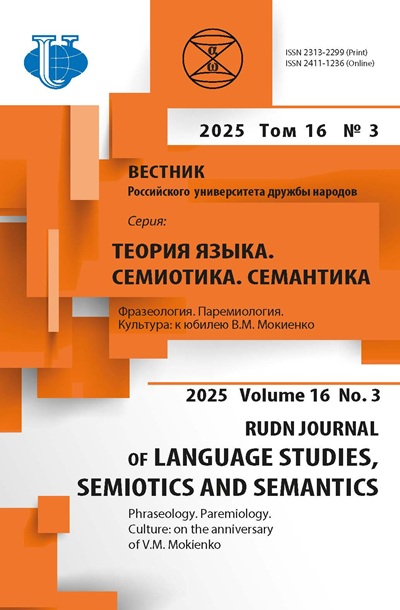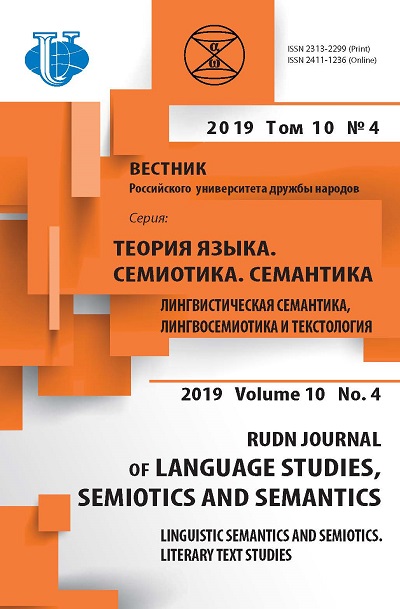Современные тенденции испанского языка и социальные изменения в испаноязычном обществе
- Авторы: Техерина Г.1
-
Учреждения:
- Российский университет дружбы народов
- Выпуск: Том 10, № 4 (2019): Лингвистическая семантика, лингвосемиотика и текстология
- Страницы: 1037-1047
- Раздел: СЕМИОТИКА И КОММУНИКАЦИЯ
- URL: https://journals.rudn.ru/semiotics-semantics/article/view/22784
- DOI: https://doi.org/10.22363/2313-2299-2019-10-4-1037-1047
- ID: 22784
Цитировать
Полный текст
Аннотация
Статья посвящена исследованию изменений лексического значения единиц испанского языка, вызванных изменениями в обществе, развитием технологий, возрастанием роли СМИ. Данное направление исследований является актуальным в современной лингвистике, так как является универсальным, с одной стороны, и предлагает новые примеры трансформации смыслов лексических единиц конкретного языка, с другой. Цель исследования, под которой автор статьи понимает установление связи между изменением языка и изменением общества и описанием их результатов, достигается с помощью наблюдений, комментариев и описанию примеров языковой дискриминации. Материалом исследования является лексика социальных сетей, молодежный жаргон, статьи в СМИ и тексты выступления современных политических деятелей. Предметом анализа выступает новая лексика или слова с новым (измененным) лексическим значением.
Ключевые слова
Об авторах
Гидо Техерина
Российский университет дружбы народов
Автор, ответственный за переписку.
Email: tejerina@yandex.ru
faculty of Philology
ул. Миклухо-Маклая, 6, Москва, Россия, 117198Список литературы
- Mearsheimer, John J. (2013). Why Leaders Lie: The Truth About Lying in international Politics. Oxford University Press.
- Villanueva, Darío. Right now Spanish is the second language in the world. URL: https://www.elcorreogallego.es/tendencia/el-correo2/ecg/ahora-mismo-espanol-es-segunda-lengua-mundo/idEdicion-2018-09-30/idNoticia-1139731 (accessed: 20-05-2019).
- The world without politicians who lie is impossible. ACV The confidential. URL: https://www.elconfidencial.com/alma-corazon-vida/2012-04-03/un-mundo-sin-politicos-que-mientan-es-imposible_522301/ (accessed: 20-05-2019).
- Seven euphemisms that gave birth to the crisis. The country. URL: https://elpais.com/elpais/ 2013/12/31/masterdeperiodismo/1386789937_226264.html (accessed: 20-05-2019).
- The euphemisms of current Chile. The citizen. Access mode: https://www.elciudadano.com/ politica/los-eufemismos-del-chile-actual/11/28/ (accessed: 20-05-2019).
- Youth jargon. Worldwide network of Hispanics. URL: http://redhispanistas.es/es/actualidad/ blogs/virgulillas-por-el-mundo/505-la-jerga-juvenil (accessed: 20-05-2019).
- Examples of juvenile jargon. Your examples URL: https://tusejemples.com/examples-of-jerga-juvenil/ (accessed: 20-05-2019).
- What does “skere” mean, the buzzword among teenagers. Clarion. URL: https://www.clarin.com/ sociedad/significa-skere-palabra-moda-adolescentes_0_z_bKQwVki.html (accessed: 20-05-2019).
- What does ATR mean? The nation. URL: https://www.lanacion.com.ar/lifestyle/que-significa-atr-nid2215737 (accessed: 20-05-2019).
- The new jargon imposed by social networks. Pymex URL: https://pymex.com/tecnologia/ internet/las-nuevas-jergas-que-imponen-las-redes-sociales/ (accessed: 20-05-2019).
- Rosado, Juan A. Linguistic discrimination. URL: http://www.siempre.mx/2018/10/discriminacion-linguistica/ (accessed: 20-05-2019).
- David, Crystal. Internet and language changes. OpenMind URL: https://www.bbvaopenmind.com/ articulos/internet-y-los-cambios-en-el-lenguaje/ (accessed: 20-05-2019).
- The impact of social networks on language. Infobae URL: https://www.infobae.com/tendencia/ 2016/07/03/como-las-redes-sociales-impactan-en-el-lenguaje/ (accessed: 20-05-2019).
- Dürscheid, C. & Jucker, A. (2011). “Text as utterance: communication in the electronic media”. Presented at the symposium “Language as a social and cultural practice: advances in linguistics”. Basel: University of Basel.
- Grice, H.P. (1975). “Logic and Conversation”. In Syntax and Semantics Volume 3: speech Acts, Peter Cole and Jerry L. Morgan (eds.). New York: Academic Press.
- Argentine Millennials: the Top 10 of the most used words by them. For you. URL: https://www.infobae.com/parati/news/2019/03/29/millennials-argentinos-el-top-10-de-las-palabras-mas-usadas-por-ellos/ (accessed: 20-05-2019).
- Juan, Ruiz Zambrana. The current situation of the Spanish language in the world. The impact of social networks on language. Malaga University. CCCSS September 2009.
- Spanish, a language in constant evolution. El Heraldo newspaper. URL: https://www.elheraldo.hn/ vida/701461-220/el-espa%C3%B1ol-una-lengua-en-constante-evoluci%C3%B3n (accessed: 20-05-2019).
- The impact of social networks on language. Infobae URL: https://www.infobae.com/tendencia/ 2016/07/03/como-las-redes-sociales-impactan-en-el-lenguaje/ (accessed: 20-05-2019).
- Changes to the Spanish language. Profelandia URL: https://profelandia.com/cambios-al-idioma-espanol/ (accessed: 20-05-2019).
- News about Language. The country. URL: https://elpais.com/tag/lengua/a (accessed: 20-05-2019).
- The new languages of young people affect the transformation of Spanish. Fundéu BBVA. URL: https://www.fundeu.es/noticia/los-nuevos-lenguajes-de-los-jovenes-afectan-la-transformacion-del-espanol-5911/ (accessed: 20-05-2019).
- Tamara, Guillemot. Evolution, development or mutation in Spanish. Reason and Word. URL: http://www.razonypalabra.org.mx/anteriores/n32/tguillemot.html (accessed: 20-05-2019).
- Latest changes in the Spanish language. Taringa URL: https://www.taringa.net/+apuntes_ y_monografias/ultimos-cambios-en-el-idioma-espanol_13rc0e (accessed: 20-05-2019).
- Monica, Quintero Restrepo. Spanish and linguistic change. The Castilian. URL: http://www.elcastellano.org/news/el-espa%C3%B1ol-y-el-cambio-ling%C3%BC%C3%ADstico (accessed: 20-05-2019).
- Isabel Gretel María Eres Fernández & Paulo Augusto Almeida Seemann (2009). A study on the linguistic changes of Spanish written in informal online talks, Trabalhos in Applied Linguistics, 48(1), Campinas Jan./June 2009.
- Sofia Benavides. Is the Spanish language macho?: the debate about arrobas, x and sexist terms. Infobae URL: https://www.infobae.com/america/cultura-america/2018/01/27/es-machista-el-idioma-espanol-el-debate-sobre-arrobas-equis-y-terminos-sexists/ (accessed: 20-05-2019).
- Karina Galperín. The language is also a reflection of social changes. The nation. URL: https://www.lanacion.com.ar/opinion/el-idioma-es-tambien-un-reflejo-de-los-cambios-sociales-nid2148044 (accessed: 20-05-2019).
- Inclusive language: just a fad or a necessity? Clarín Live. URL: https://www.clarin.com/viva/ lenguaje-inclusivo-solo-moda-necesidad_0_KKh-SDBnE.html (accessed: 20-05-2019).
- Marcelo Pasetti. For the director of the SAR, the inclusive language “is a hasty solution” and called to have “little travel”. The capital. URL: https://www.lacapitalmdp.com/ppara-el-director-de-la-rae-el-lenguaje-inclusivo-es-una-solucion-precipitada-y-llamada-a-tener-poco-tour/ (accessed: 20-05-2019).
Дополнительные файлы












